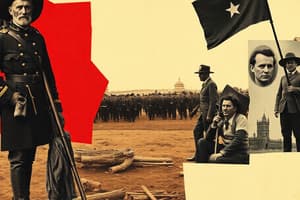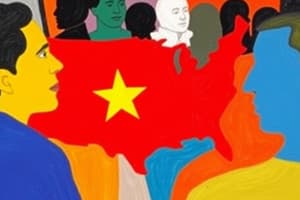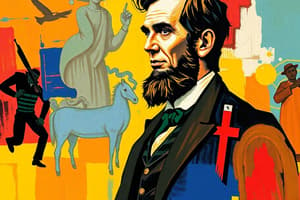Podcast
Questions and Answers
What role did slavery play in the economy of the Southern states?
What role did slavery play in the economy of the Southern states?
- It fueled industrial growth.
- It was primarily a practice of necessity.
- It was used mainly for agricultural purposes. (correct)
- It had no significant impact on their economy.
How did the North's approach to slavery differ from that of the South?
How did the North's approach to slavery differ from that of the South?
- The North had a higher number of plantations compared to the South.
- The North relied on slave labor for industrial production.
- The North entirely supported the continuation of slavery.
- The North did not require slaves for economic growth. (correct)
What was the primary objective of the Missouri Compromise?
What was the primary objective of the Missouri Compromise?
- To promote the expansion of slavery into new territories.
- To abolish slavery throughout the United States.
- To strengthen the Federal Government's power over states.
- To enable a balanced admission of both free and slave states. (correct)
Which event intensified the national debate over slavery in the 1850s?
Which event intensified the national debate over slavery in the 1850s?
What was a significant outcome of the Compromise of 1850 regarding Washington D.C.?
What was a significant outcome of the Compromise of 1850 regarding Washington D.C.?
What was one consequence of Kentucky Senator Henry Clay's actions?
What was one consequence of Kentucky Senator Henry Clay's actions?
What was the main concern for Southerners regarding Northern actions?
What was the main concern for Southerners regarding Northern actions?
What was a stipulation regarding new states under the Missouri Compromise?
What was a stipulation regarding new states under the Missouri Compromise?
What did South Carolina threaten to do in 1832 in response to the tariff?
What did South Carolina threaten to do in 1832 in response to the tariff?
What was a significant consequence of the Missouri Compromise?
What was a significant consequence of the Missouri Compromise?
How did Northern abolitionists view slavery in relation to the Southern economy?
How did Northern abolitionists view slavery in relation to the Southern economy?
What was the reason many Southern states believed in the doctrine of states' rights?
What was the reason many Southern states believed in the doctrine of states' rights?
What economic reliance characterized the Southern states in the 1800s?
What economic reliance characterized the Southern states in the 1800s?
Which factor contributed to the tensions between the North and the South regarding new states?
Which factor contributed to the tensions between the North and the South regarding new states?
What did the 1833 Congress decision aim to resolve regarding the tariff?
What did the 1833 Congress decision aim to resolve regarding the tariff?
What argument did wealthy Southern plantation owners make regarding Northern interference?
What argument did wealthy Southern plantation owners make regarding Northern interference?
What was the primary reason President Jackson implemented a tariff in 1828?
What was the primary reason President Jackson implemented a tariff in 1828?
What doctrine did South Carolina invoke to challenge the tariff imposed by the federal government?
What doctrine did South Carolina invoke to challenge the tariff imposed by the federal government?
In the context of Southern beliefs, what did many people assert about federal laws?
In the context of Southern beliefs, what did many people assert about federal laws?
How did the economy of the South primarily depend in the 1800s?
How did the economy of the South primarily depend in the 1800s?
What was one of the major grievances of Southerners regarding the federal government during the 1800s?
What was one of the major grievances of Southerners regarding the federal government during the 1800s?
Which statement best represents the belief in state secession during the 1800s?
Which statement best represents the belief in state secession during the 1800s?
What was the primary agricultural product that relied heavily on slave labor in the South?
What was the primary agricultural product that relied heavily on slave labor in the South?
What did the original U.S. Constitution say about slavery?
What did the original U.S. Constitution say about slavery?
What was one of the primary outcomes of the Dred Scott case?
What was one of the primary outcomes of the Dred Scott case?
What was the main aim of the Republican Party when it was formed in 1854?
What was the main aim of the Republican Party when it was formed in 1854?
Which candidate did the Southern Democrats nominate in the 1860 election?
Which candidate did the Southern Democrats nominate in the 1860 election?
What was the result of Georgia's special secession convention?
What was the result of Georgia's special secession convention?
What critical issue did Abraham Lincoln's election raise among Southern states?
What critical issue did Abraham Lincoln's election raise among Southern states?
Which proposal was suggested by Northern Democrats regarding territories?
Which proposal was suggested by Northern Democrats regarding territories?
What warning did Alexander Stephens give regarding a civil war?
What warning did Alexander Stephens give regarding a civil war?
What significant differences contributed to tensions between the northern and southern states before the Civil War?
What significant differences contributed to tensions between the northern and southern states before the Civil War?
What was a key feature of the Dred Scott v. Sanford case?
What was a key feature of the Dred Scott v. Sanford case?
Which political party was primarily identified with Abraham Lincoln during the Election of 1860?
Which political party was primarily identified with Abraham Lincoln during the Election of 1860?
What was one major concern of the Democratic Party during the Election of 1860?
What was one major concern of the Democratic Party during the Election of 1860?
In the context of events leading to the Civil War, which event is associated directly with tensions regarding slavery?
In the context of events leading to the Civil War, which event is associated directly with tensions regarding slavery?
What was the purpose of designing a political button for Lincoln's campaign?
What was the purpose of designing a political button for Lincoln's campaign?
Which topic is NOT part of the 6-panel storyboard outlining events leading to the Civil War?
Which topic is NOT part of the 6-panel storyboard outlining events leading to the Civil War?
What did students need to illustrate and caption in their storyboards?
What did students need to illustrate and caption in their storyboards?
What was a significant aspect of the Georgia Platform?
What was a significant aspect of the Georgia Platform?
What was a key reason why many Southerners believed in states' rights?
What was a key reason why many Southerners believed in states' rights?
What did the Compromise of 1850 aim to achieve?
What did the Compromise of 1850 aim to achieve?
What was the main outcome of the Dred Scott Case?
What was the main outcome of the Dred Scott Case?
What plea did the Georgia Platform make regarding the Compromise of 1850?
What plea did the Georgia Platform make regarding the Compromise of 1850?
Which event is often attributed to the division of the Democratic Party in the Election of 1860?
Which event is often attributed to the division of the Democratic Party in the Election of 1860?
What was the federal response to the issue of nullification as presented by South Carolina?
What was the federal response to the issue of nullification as presented by South Carolina?
What was a major consequence following the election of Abraham Lincoln in 1860?
What was a major consequence following the election of Abraham Lincoln in 1860?
Which term refers to the belief that states could invalidate federal laws they deemed unconstitutional?
Which term refers to the belief that states could invalidate federal laws they deemed unconstitutional?
The economic structure of the South largely depended on which of the following?
The economic structure of the South largely depended on which of the following?
What was the significance of Georgia's Secession in January 1861?
What was the significance of Georgia's Secession in January 1861?
Flashcards
States' Rights
States' Rights
The right of states to govern themselves and their own affairs, independent of the federal government.
Nullification
Nullification
The idea that a state could choose to ignore or reject federal laws that it deemed unconstitutional.
Secession
Secession
The practice of withdrawing a state from the Union, ending its membership.
Slavery
Slavery
Signup and view all the flashcards
Southern Economy
Southern Economy
Signup and view all the flashcards
Northern Economy
Northern Economy
Signup and view all the flashcards
Missouri Compromise
Missouri Compromise
Signup and view all the flashcards
Compromise
Compromise
Signup and view all the flashcards
Slavery in the US Constitution
Slavery in the US Constitution
Signup and view all the flashcards
North vs South Economies
North vs South Economies
Signup and view all the flashcards
Slavery as a Divisive Issue
Slavery as a Divisive Issue
Signup and view all the flashcards
Compromise of 1850
Compromise of 1850
Signup and view all the flashcards
Fugitive Slave Act
Fugitive Slave Act
Signup and view all the flashcards
Tariff
Tariff
Signup and view all the flashcards
North-South Divide
North-South Divide
Signup and view all the flashcards
Slave Trade
Slave Trade
Signup and view all the flashcards
Plantations
Plantations
Signup and view all the flashcards
Dred Scott Decision
Dred Scott Decision
Signup and view all the flashcards
Republican Party
Republican Party
Signup and view all the flashcards
1860 Democratic Division
1860 Democratic Division
Signup and view all the flashcards
Lincoln's Election
Lincoln's Election
Signup and view all the flashcards
Georgia Secession
Georgia Secession
Signup and view all the flashcards
Key Issues Before the Civil War
Key Issues Before the Civil War
Signup and view all the flashcards
The American Civil War
The American Civil War
Signup and view all the flashcards
Georgia Platform
Georgia Platform
Signup and view all the flashcards
Dred Scott Case
Dred Scott Case
Signup and view all the flashcards
Election of 1860
Election of 1860
Signup and view all the flashcards
Georgia’s Secession
Georgia’s Secession
Signup and view all the flashcards
Impact of Dred Scott Case
Impact of Dred Scott Case
Signup and view all the flashcards
Republican Party in 1860
Republican Party in 1860
Signup and view all the flashcards
Democratic Party in 1860
Democratic Party in 1860
Signup and view all the flashcards
Debate Over GA Secession
Debate Over GA Secession
Signup and view all the flashcards
Study Notes
Events Leading to the Civil War
- Significant differences divided the North and South long before the Civil War began in 1861
- Two key issues increasing tensions: states' rights and slavery
- Tariffs: Northern factories thrived, but Southerners preferred cheaper imported goods. In 1828, President Jackson imposed tariffs to protect Northern industries. Southerners opposed these tariffs because they believed they favored Northern interests.
- Nullification: In 1832, South Carolina declared a federal tariff invalid within its borders, threatening to withdraw from the Union. Congress lowered the tariff to avoid a crisis.
- States' Rights: Southerners increasingly argued for states' autonomy over federal laws. They believed states should control their own affairs. Many Southern states believed they could secede (withdraw) from the Union if they chose.
- Slavery: Slavery became a major source of conflict and division between the North and the South. The North's abolitionist movement contrasted with the South's reliance on slave labor.
The Missouri Compromise of 1820
- This compromise addressed the issue of whether slavery would spread to new territories.
- Slavery was restricted in certain areas; states north of a certain latitude would be free, and states south of that latitude would permit slavery.
- Maine joined as a free state and Missouri joined as a slave state.
Compromise of 1850
- The US gained territory after the Mexican-American War, causing debates about the spread of slavery.
- California entered the Union as a free state.
- The Fugitive Slave Act required the return of escaped slaves to their owners.
- The compromise avoided immediate conflict but did not resolve the underlying issues and divisions over slavery.
The Georgia Platform
- Georgia's lawmakers debated and adapted the Georgia Platform in 1850.
- It outlined Georgia's willingness to accept the Compromise of 1850 but demanded that the North enforce the Fugitive Slave Act.
Dred Scott v. Sanford Case
- Dred Scott, a Missouri slave, sued for his freedom after living in free territories.
- The Supreme Court ruled that enslaved African Americans were not citizens and had no right to sue.
- The ruling stated that the federal government could not prohibit the expansion of slavery into new territories.
- This ruling inflamed tensions between the North and South and further fueled the debate over slavery.
The Election of 1860
- Abraham Lincoln was elected president.
- Southern states felt that Lincoln's election was a threat to their way of life and their right to have slaves.
- South Carolina seceded from the Union on December 20, 1860.
Secession
- Georgia's legislature called for a special convention to decide on whether or not to secede from the Union.
- Georgia delegates voted to secede in January of 1861.
Studying That Suits You
Use AI to generate personalized quizzes and flashcards to suit your learning preferences.




